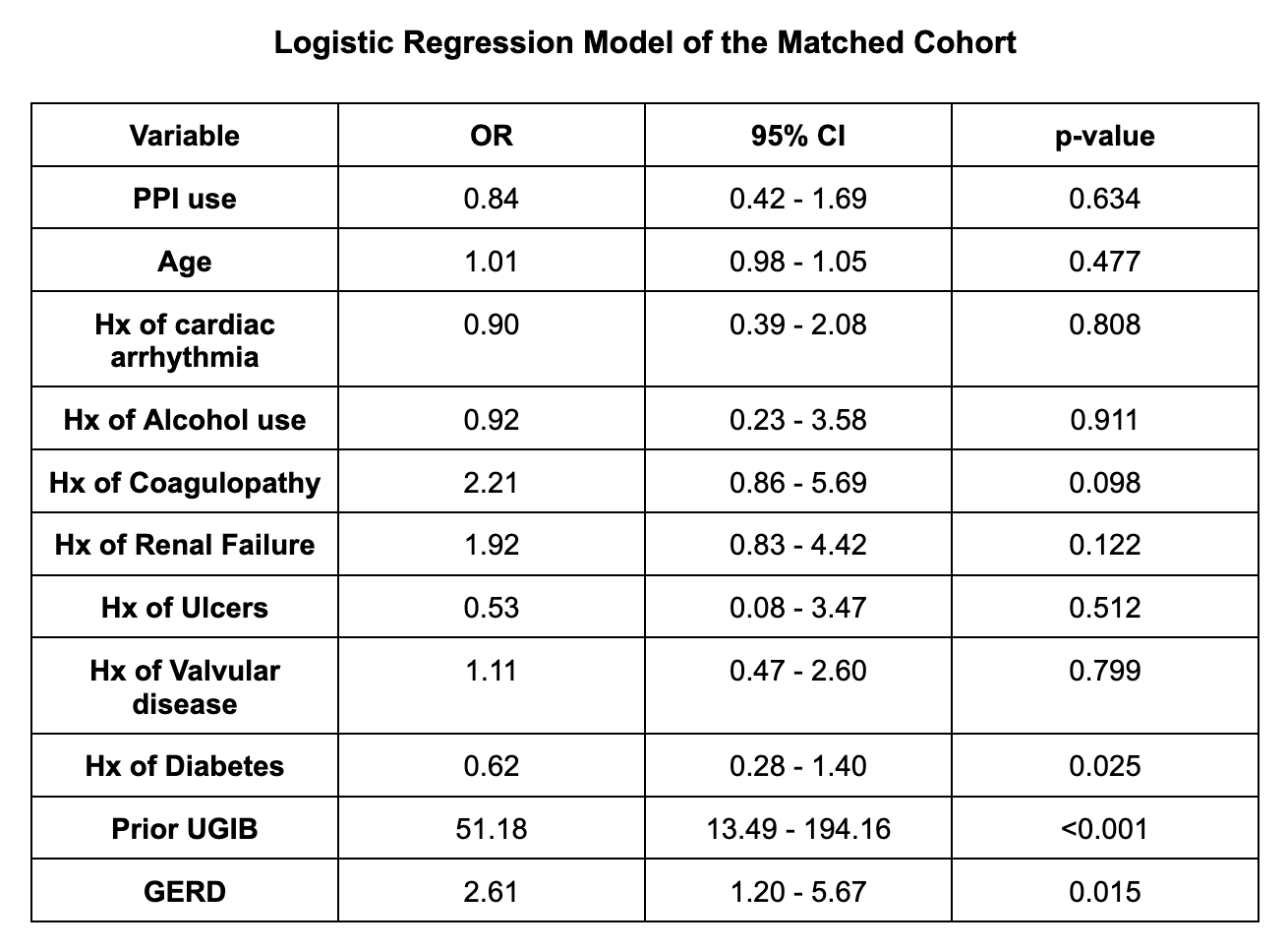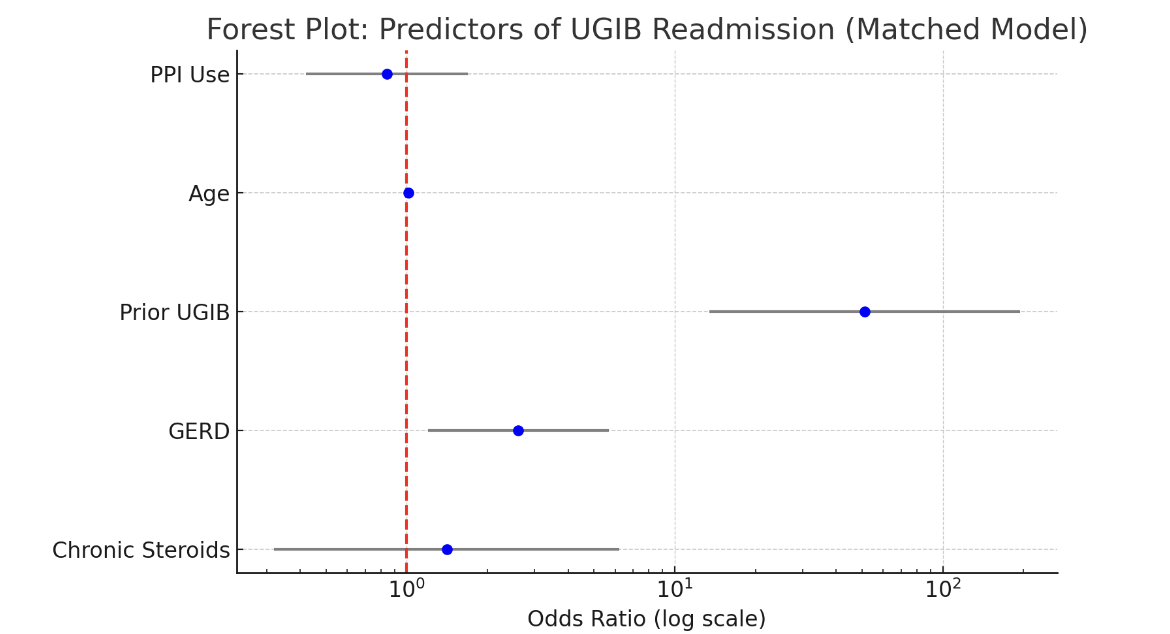Sunday Poster Session
Category: GI Bleeding
P0916 - Proton Pump Inhibitor Use and Risk of Upper Gastrointestinal Bleeding Readmission in Patients on Dual Antiplatelet Therapy Post-PCI: A Retrospective Cohort Study
Sunday, October 26, 2025
3:30 PM - 7:00 PM PDT
Location: Exhibit Hall

Tulsi Patel, DO
Christiana Care Health System
Newark, DE
Presenting Author(s)
Tulsi Patel, DO, Vincent Mack, DO, Samir Mehta, DO, Neil Wimmer, MD, Hussain Azizi, MD
Christiana Care Health System, Newark, DE
Introduction: Patients started on dual antiplatelet therapy (DAPT) have an increased risk for spontaneous bleeding, particularly within the gastrointestinal tract (Kazi, 2015). Balancing the risk of recurrent cardiovascular events with the risk of bleeding has been a long standing dilemma. Part of this issue includes differing recommendations internationally; the ACG/AHA recommends proton pump inhibitors (PPI) only for high-risk individuals, while routine PPI use in all patients on DAPT is a Class I recommendation according to European Society of Cardiology. This study aimed to evaluate whether PPI use is associated with reduced 1-year readmission for upper GI bleeding (UGIB) in patients initiated on DAPT after percutaneous coronary intervention (PCI).
Methods: We conducted a single center retrospective cohort analysis of 3,611 patients who underwent PCI between the years 2020 to 2023 and were started on DAPT. Patients with a history of lower GI bleeding, cirrhosis, or esophageal varices were excluded. Patients were stratified by PPI use. Statistical analysis was done using multivariable logistic regression model adjusted for age and various co-morbidities - including history of UGIB, GERD, and chronic steroid use. Additionally, propensity score matching was used to categorize patients into the “high risk” category, resulting in a matched cohort of 1,824 patients.
Results: In the unmatched cohort, there was no statistical difference in 1 year readmission rate for UGIB post-PCI in the PPI group versus non-PPI (OR 0.98; 95% CI 0.55–1.75; p=0.951). Similar results were observed in the matched cohort (OR 0.84; 95% CI 0.42–1.69; p=0.634). History of UGIB (OR 51) and GERD (OR 2.6) were strong independent predictors of 1 year readmission for UGIB. Utilizing Fisher Exact test, a post-hoc subgroup analysis of 14 patients with prior UGIB showed equal readmission rates in PPI vs non-PPI users (OR 1.0; p=1.0).
Discussion: Routine PPI use in patients on DAPT after PCI was not associated with reduced risk of UGIB-related readmission. Even among patients with prior UGIB, no protective benefit was observed with PPI co-therapy. These findings challenge the utility of a blanket prophylactic approach and instead support a more individualized strategy taking into account patient-specific risk factors - such as prior UGIB and GERD. Our subgroup analysis was limited by small sample size, thus larger studies focusing on high risk subgroups are needed to define optimal prophylaxis strategies. AI was used for grammar editing.

Figure: This forest plot of the matched cohort shows the odds ratio with a 95% confidence interval for key predictors. PPI use, age and chronic steroid use had no statistically significant impact on readmission rate for UGIB within 1 year while prior history of UGIB and GERD were identified as strong predictors.

Figure: This table is a logistic regression model of the matched cohort identifying the odds ratio of 1 year UGIB readmission comparing various comorbidities and key high risk variables. Prior UGIB and GERD stand out as statistically significant predictors.
Disclosures:
Tulsi Patel indicated no relevant financial relationships.
Vincent Mack indicated no relevant financial relationships.
Samir Mehta indicated no relevant financial relationships.
Neil Wimmer indicated no relevant financial relationships.
Hussain Azizi indicated no relevant financial relationships.
Tulsi Patel, DO, Vincent Mack, DO, Samir Mehta, DO, Neil Wimmer, MD, Hussain Azizi, MD. P0916 - Proton Pump Inhibitor Use and Risk of Upper Gastrointestinal Bleeding Readmission in Patients on Dual Antiplatelet Therapy Post-PCI: A Retrospective Cohort Study, ACG 2025 Annual Scientific Meeting Abstracts. Phoenix, AZ: American College of Gastroenterology.
Christiana Care Health System, Newark, DE
Introduction: Patients started on dual antiplatelet therapy (DAPT) have an increased risk for spontaneous bleeding, particularly within the gastrointestinal tract (Kazi, 2015). Balancing the risk of recurrent cardiovascular events with the risk of bleeding has been a long standing dilemma. Part of this issue includes differing recommendations internationally; the ACG/AHA recommends proton pump inhibitors (PPI) only for high-risk individuals, while routine PPI use in all patients on DAPT is a Class I recommendation according to European Society of Cardiology. This study aimed to evaluate whether PPI use is associated with reduced 1-year readmission for upper GI bleeding (UGIB) in patients initiated on DAPT after percutaneous coronary intervention (PCI).
Methods: We conducted a single center retrospective cohort analysis of 3,611 patients who underwent PCI between the years 2020 to 2023 and were started on DAPT. Patients with a history of lower GI bleeding, cirrhosis, or esophageal varices were excluded. Patients were stratified by PPI use. Statistical analysis was done using multivariable logistic regression model adjusted for age and various co-morbidities - including history of UGIB, GERD, and chronic steroid use. Additionally, propensity score matching was used to categorize patients into the “high risk” category, resulting in a matched cohort of 1,824 patients.
Results: In the unmatched cohort, there was no statistical difference in 1 year readmission rate for UGIB post-PCI in the PPI group versus non-PPI (OR 0.98; 95% CI 0.55–1.75; p=0.951). Similar results were observed in the matched cohort (OR 0.84; 95% CI 0.42–1.69; p=0.634). History of UGIB (OR 51) and GERD (OR 2.6) were strong independent predictors of 1 year readmission for UGIB. Utilizing Fisher Exact test, a post-hoc subgroup analysis of 14 patients with prior UGIB showed equal readmission rates in PPI vs non-PPI users (OR 1.0; p=1.0).
Discussion: Routine PPI use in patients on DAPT after PCI was not associated with reduced risk of UGIB-related readmission. Even among patients with prior UGIB, no protective benefit was observed with PPI co-therapy. These findings challenge the utility of a blanket prophylactic approach and instead support a more individualized strategy taking into account patient-specific risk factors - such as prior UGIB and GERD. Our subgroup analysis was limited by small sample size, thus larger studies focusing on high risk subgroups are needed to define optimal prophylaxis strategies. AI was used for grammar editing.

Figure: This forest plot of the matched cohort shows the odds ratio with a 95% confidence interval for key predictors. PPI use, age and chronic steroid use had no statistically significant impact on readmission rate for UGIB within 1 year while prior history of UGIB and GERD were identified as strong predictors.

Figure: This table is a logistic regression model of the matched cohort identifying the odds ratio of 1 year UGIB readmission comparing various comorbidities and key high risk variables. Prior UGIB and GERD stand out as statistically significant predictors.
Disclosures:
Tulsi Patel indicated no relevant financial relationships.
Vincent Mack indicated no relevant financial relationships.
Samir Mehta indicated no relevant financial relationships.
Neil Wimmer indicated no relevant financial relationships.
Hussain Azizi indicated no relevant financial relationships.
Tulsi Patel, DO, Vincent Mack, DO, Samir Mehta, DO, Neil Wimmer, MD, Hussain Azizi, MD. P0916 - Proton Pump Inhibitor Use and Risk of Upper Gastrointestinal Bleeding Readmission in Patients on Dual Antiplatelet Therapy Post-PCI: A Retrospective Cohort Study, ACG 2025 Annual Scientific Meeting Abstracts. Phoenix, AZ: American College of Gastroenterology.
